Are you sure you want to report this content?

Today on 2nd October 1904 our great India was blessed with the birth of legend most popular mass leader Shri Lal Bahadur Shastri Ji, India's ex Prime mInister.
I pay my homage with heart full of respect, I bow my head to a great patriot who gave the well deserving respect to our soldiers and farmers and said "Jai Jawan Jai Kisan"
We Indians should be indebted to such a nice, simple, pure and dedicated leader with a clear vision. In a short span he made India proud by winning a War and made shining our country on world Map.
His death(?) was a setback to India. There are still serious doubts surrounding the nature of his death.
Salute to a GREAT MAN!
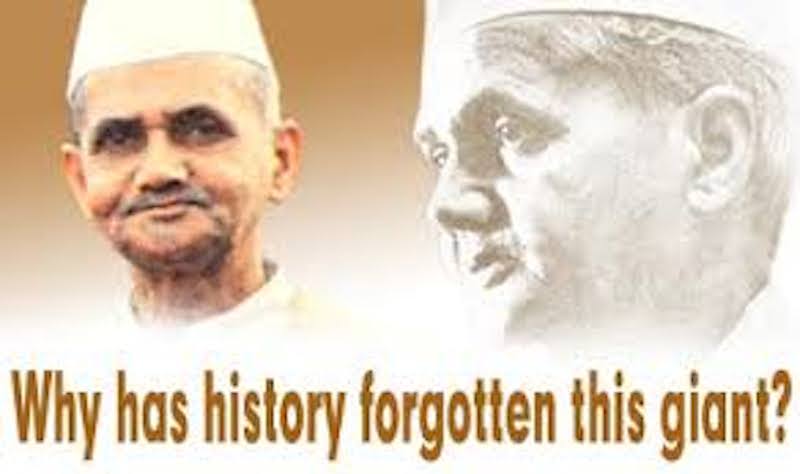
Lal Bahadur Shastri (2nd October 1904 – 11th January 1966) was the Second Prime Minister of the Republic of India and a leader of the Indian National Congress party.
Shastri jee joined the Indian independence movement in the 1920s @ young age of 16. Deeply impressed and influenced by Mahatma Gandhi, he became a loyal follower of Gandhi. Following independence in 1947, he joined the government and became one of Prime Minister Nehru's principal lieutenants, first as Railways Minister (1951–56), and then in a variety of other functions, including Home Minister. Shastri was chosen as Nehru's successor owing to his adherence to Nehruvian socialism.
Shastri as Prime Minister continued Nehru's policies of non-alignment and socialism. He led the country during the Indo-Pakistan War of 1965. His slogan of "Jai Jawan Jai Kisan" ("Hail the soldier, Hail the farmer") became very popular during the war and is remembered even today. The war formally ended with the Tashkent Agreement of 10 January 1966; he died of heart attack the following day, still inTashkent. The cause of death has been a subject of conspiracy theories.
Jawaharlal Nehru died in office on 27 May 1964 and left a void. Then Congress Party President K. Kamaraj was instrumental in making Shastri Prime Minister on 9th June. Shastri jee, though mild-mannered and soft-spoken, was a Nehruvian socialist and thus held appeal to those wishing to prevent the ascent of conservative right-winger Morarji Desai.
In his first broadcast as Prime Minister, on 11 June 1964, Shastri stated:
"There comes a time in the life of every nation when it stands at the cross-roads of history and must choose which way to go. But for us there need be no difficulty or hesitation, no looking to right or left. Our way is straight and clear—the building up of a socialist democracy at home with freedom and prosperity for all, and the maintenance of world peace and friendship with all nations."
Shri Lal Bahadur Shastri was one of those great Indians who has left an indelible impression on our collective life. His contributions to our public life were unique in that they were made in the closest proximity to the life of the common man in India. He was looked upon by Indians as one of their own, one who shared their ideals, hopes and aspirations. His achievements were looked upon not as the isolated achievements of an individual but of our society collectively.
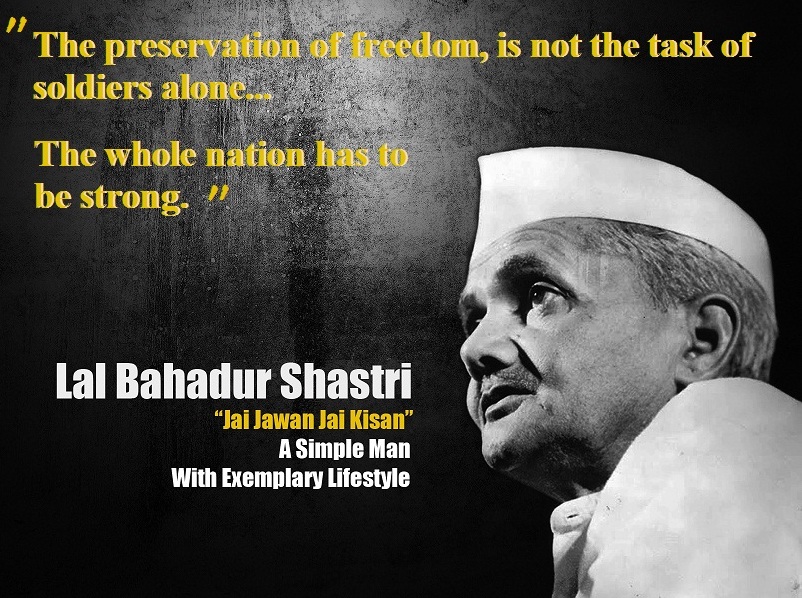
Under his leadership India faced and repulsed the Pakistani invasion of 1965. It is not only a matter of pride for the Indian Army but also for every citizen of the country. Shri Lal Bahadur Shastri's slogan 'Jai Jawan! Jai Kishan!!' reverberates even today through the length and breadth of the country. Underlying this is the inner-most sentiments 'Jai Hind'. The war of 1965 was fought and won for our self-respect and our national prestige. For using our Defence Forces with such admirable skill, the nation remains beholden to Shri Lal Bahadur Shastri. He will be remembered for all times to come for his large heartedness and public service.
Shastrijee's greatest moment came when he led India in the 1965 Indo-Pak War.
Laying claim to half the Kutch peninsula, the Pakistani army skirmished with Indian forces in August, 1965. In his report to the Lok Sabha on the confrontation in Kutch, Shastri jee stated:
In the utilization of our limited resources, we have always given primacy to plans and projects for economic development. It would, therefore, be obvious for anyone who is prepared to look at things objectively that India can have no possible interest in provoking border incidents or in building up an atmosphere of strife... In these circumstances, the duty of Government is quite clear and this duty will be discharged fully and effectively... We would prefer to live in poverty for as long as necessary but we shall not allow our freedom to be subverted.
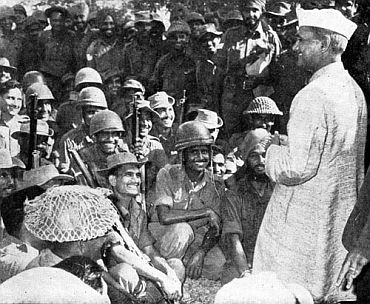
Under a scheme proposed in June 1965 by British Prime Minister Harold Wilson, Pakistan obtained 10%, in place of their original claim of 50% of the territory. But Pakistan's aggressive intentions were also focused on Kashmir. When armed infiltrators from Pakistan began entering the State of Jammu and Kashmir, Shastri jee made it clear to Pakistan that force would be met with force. In September 1965, major incursions of militants and Pakistani soldiers began, hoping not only to break down the government but incite a sympathetic revolt. The revolt did not happen, and India sent its forces across the Ceasefire Line (now Line of Control) and threatened Pakistan by crossing the International Border near Lahore as war broke out on a general scale. Massive tank battles occurred in the Punjab, and while the Pakistani forces made some gains, Indian forces captured the key post at Haji Pir, in Kashmir, and brought the Pakistani city of Lahore under artillery and mortar fire.
On 17 September 1965, while the Indo-Pak war was on, India received a letter from China alleging that the Indian army had set up army equipment in Chinese territory, and India would face China's wrath, unless the equipment was pulled down. In spite of the threat of aggression from China, Shastri jee declared "China's allegation is untrue. If China attacks India it is our firm resolve to fight for our freedom. The might of China will not deter us from defending our territorial integrity. The Chinese did not respond, but the Indo-Pak war resulted in some 3,000 to 4,000 casualties on each side and significant loss of material.
The Indo-Pak war ended on 23 September 1965 with a United Nations-mandated ceasefire. By that time, India had inflicted a crushing defeat on Pakistan. In a broadcast to the nation on the day the of ceasefire, Shastri stated:
"While the conflict between the armed forces of the two countries has come to an end, the more important thing for the United Nations and all those who stand for peace is to bring to an end the deeper conflict.... How can this be brought about? In our view, the only answer lies in peaceful coexistence. India has stood for the principle of coexistence and championed it all over the world. Peaceful coexistence is possible among nations no matter how deep the differences between them, how far apart they are in their political and economic systems, no matter how intense the issues that divide them."
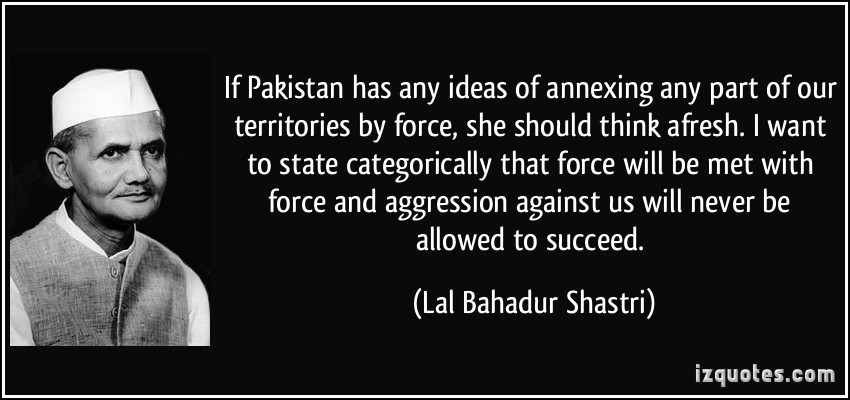
During his tenure as Prime Minister, Shastri jee visited many countries including Russia, Yugoslavia, England, Canada, Nepal, Egypt and Burma. Incidentally while returning from the Non Alliance Conference in Cairo on the invitation of then President of the Pakistan Ayub Khan to have lunch with him, Shastri made a stop over at Karachi Airport for few hours and breaking from the protocol Mr.Ayub Khan personally received him at the Airport and had an informal meeting during October 1964. After the declaration of ceasefire with Pakistan in 1965, Shastri and Pakistani President Muhammad Ayub Khan attended a summit in Tashkent (former USSR, now in modern Uzbekistan), organized by Alexei Kosygin. On 10 January 1966, Shastri and Khan signed the Tashkent Declaration.
Prime Minister Shastri died in Tashkent, the day after signing the Tashkent Declaration, reportedly due to a heart attack, but people allege conspiracy behind the death. He was eulogised as a national hero and the Vijay Ghat memorial established in his memory. Upon his death, Gulzarilal Nanda once again assumed the role of acting Prime Minister until the Congress Parliamentary Party elected Indira Gandhi over Morarji Desai to officially succeed Shastri.
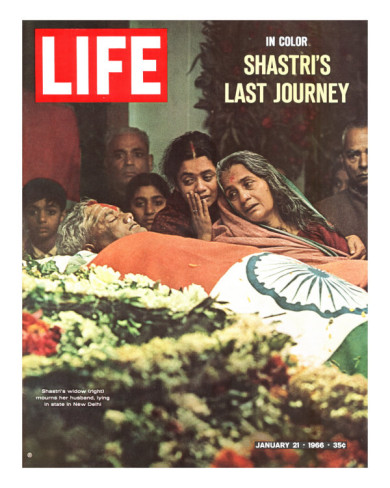
Shastri's sudden death immediately after signing the Tashkent Pact with Pakistan raised many questions in the minds of Indian citizens. The Prime Minister of India going to Tashkent for a pact and never coming back has not been accepted easily by Indian citizens. His health was fit as per his personal physician, Dr. R. N. Chugh, and he had no sign of heart trouble before.
Shastri's sudden death has led to persistent conspiracy theories that he was poisoned. The first inquiry into his death, conducted by the Raj Narain Inquiry, as it came to be known, however did not come up with any conclusions, and today no record of this inquiry exists with the Indian Parliament's library.
It was alleged that no post-mortem was done on Shastri, but the Indian government in 2009, claimed it did have a report of a medical investigation conducted by Shastri's personal physician, Dr. R. N. Chugh, and some Russian doctors. Furthermore, the Prime Minister's Office (PMO) revealed that there was no record of any destruction or loss of documents in the PMO having a bearing on Shastri's death.
The Russian butler attending on Shastri at the time of his death was arrested for suspected poisoning but released later as per the news source. It was maintained that Shastri had died of cardiac arrest but his family insisted he was poisoned.
After Shastri's death, aged 62, in Tashkent, USSR, on 11 January 1966, soon after signing the Tashkent Pact with Pakistan, his wife Lalita Shastri had alleged he was poisoned. An epic poetry book in Hindi titled Lalita Ke Aansoo written by Krant M. L. Verma was published in 1978. In this book, the tragic story about the death of Shastri has been narrated by his wife Lalita Shastri.
There are still serious doubts surrounding the nature of his death. His son, Sunil Shastri, asked the government to unravel the mystery behind Lal Bahadur Shastri's death. Raising doubts about the dark blue spots and cut marks on the abdomen of his father's body after his death in 1966, Sunil asked how the cut marks appeared if a post-mortem had not been conducted.
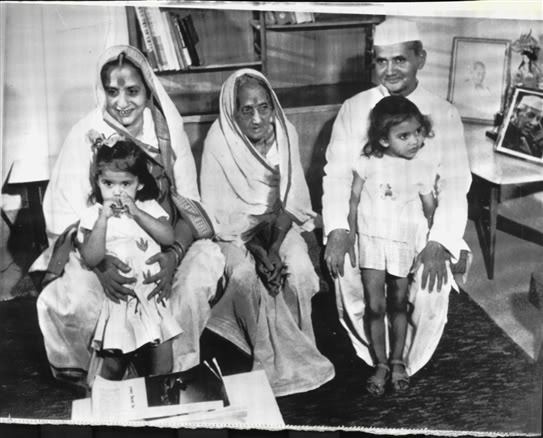
Shastri jee With Family
When Shastri went to the USSR for the Tashkent talks, he wanted a promise from Ayub Khan that Pakistan would never use force in the future. But the talks did not proceed. What followed the next day was Shastri’s Death. The Indian Government released no information about his death, and the media then was kept silent. The possible existence of a conspiracy was covered in India by the Outlook magazine.
A query was later posed by Anuj Dhar, author of CIA's Eye on South Asia, under the Right to Information Act to declassify a document supposedly related to Shastrijee's death, but the Prime Minister's Office refused to oblige, reportedly citing that this could lead to harming of foreign relations, cause disruption in the country and cause breach of parliamentary privileges. Another RTI plea by Kuldip Nayar was also declined, as PMO cited exemption from disclosure on the plea. The home ministry is yet to respond to queries whether India conducted a post-mortem on Shastri, and if the government had investigated allegations of foul play.
The Delhi Police in their reply to an RTI application said they do not have any record pertaining to Shastri's death. The Ministry of External Affairs has already said no post-mortem was conducted in the USSR. The Central Public Information Officer of Delhi Police in his reply said, "No such record related to the death of the former Prime Minister of India Lal Bahadur Shastri is available in this district. Hence the requisite information pertaining to New Delhi district may please be treated as nil. This has created more doubts.
The PMO answered only two questions of the RTI application, saying it has only one classified document pertaining to the death of Shastri, which is exempted from disclosure under the RTI Act. It sent the rest of the questions to the Ministry of External Affairs and Home Ministry to answer. The MEA said the only document from the erstwhile Soviet Government is "the report of the Joint Medical Investigation conducted by a team comprising Dr. R. N. Chugh, Doctor in-Attendance to the PM and some Russian doctors" and added no post-mortem was conducted in the USSR.
The Home Ministry referred the matter to Delhi Police and National Archives for the response pertaining to any post-mortem conducted on the body of Shastri jee in India. Sunil Shastri, son of the former Prime Minister, called the transferring of application as "absurd" and "silly joke". "He (Lal Bahadur Shastri) died as sitting Prime Minister. It sounds very silly that MHA is referring the matter of death of second Prime Minister of India to a district level police." He also demanded that "It should be looked into by highest authorities like President, Prime Minister and home minister.
Heart Felt Regards to the Departed Holy Soul. भारत माता की जय।
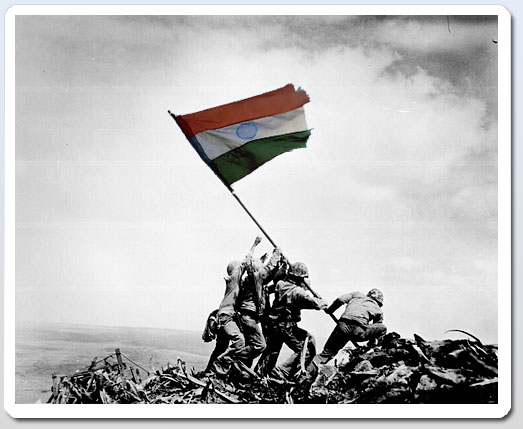
Disclaimer:
This is work of Tribute to the Martyrs of India. Persons, locality, area, organizations, companies or products listed in the post are collected from various sources and are for the purpose of writing post only and no actual attitude toward or connection with such is to be inferred.
Readers should have their own studies before using any information and writer should not be held responsible for any consequences thereof.
Grateful:

My Parents(My GOD & GODDESS)
launchora.com
Wikipedia
Photo courtesy
99freenation.com
revisitingindia.com
wordpress.com
google.com
Best Regards
Pavan Datta

4026 Launches
Part of the Something Else collection
Updated on October 02, 2021
(6)
Characters left :
Category
You can edit published STORIES
Are you sure you want to delete this opinion?
Are you sure you want to delete this reply?
Are you sure you want to report this content?
This content has been reported as inappropriate. Our team will look into it ASAP. Thank You!

By signing up you agree to Launchora's Terms & Policies.